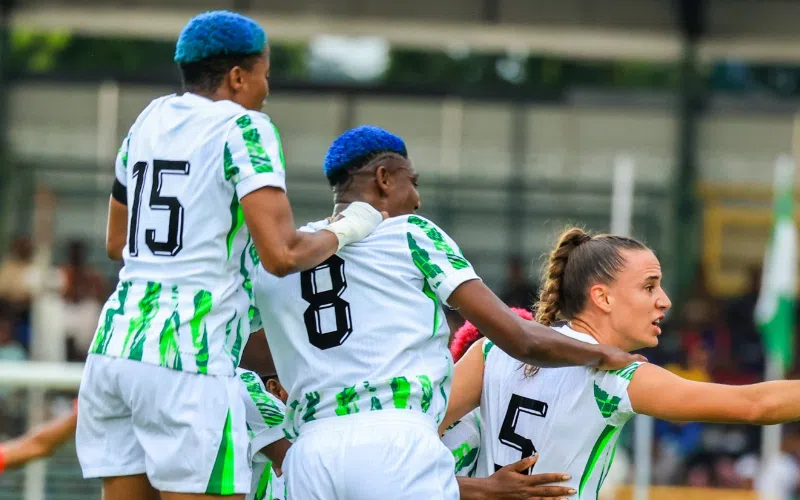In the unfolding story of Super Eagles vs Benin – 2026 WAFCON Qualification, the central chapter belongs to Nigeria’s Super Falcons, who secured their ticket to the 2026 Women’s Africa Cup of Nations with a composed 1-1 draw in Abeokuta and a 3-1 aggregate triumph over Benin. The qualification completes a professional two-leg job, and it also resonates with a larger Nigeria versus Benin narrative that has shaped both programs in recent weeks.
The ten-time African champions carried a 2-0 advantage from the first leg in Lome into the return match at the MKO Abiola Stadium, and while the Amazons of Benin pushed hard, the reigning champions managed the moments that mattered. A draw at home was enough, and with it came confirmation that Nigeria will be back on the biggest continental stage to defend their crown in 2026.
How Nigeria completed the job in Abeokuta
Playing in front of a lively MKO Abiola Stadium crowd, the Falcons struck early. Ashleigh Plumptre made the breakthrough with her first international goal, arriving with perfect timing to meet a precise delivery from Esther Okoronkwo in the 12th minute and guide her header beyond the Benin back line.
The second half brought a test of nerve. Nigeria looked set to add to their lead, only for captain Rasheedat Ajibade to miss a significant chance that would have settled the contest. Benin refused to fold, and their persistence was rewarded in the 80th minute with an equaliser that underlined a gritty away performance.
What stood out was Benin’s blend of youth and experience. The visitors featured ten overseas-based professionals, yet they carried the appetite and energy of a squad that has embraced an accelerated learning curve. The result, a 1-1 draw on the day, was a fair reflection of the intensity they brought to Abeokuta.
Benin’s youth movement meets African champions
Head coach Abdoulaye Ouzerou framed this tie as a vital classroom for a young group still under construction. He is blending fresh faces from the U-17 and U-20 ranks into the senior team, with eight players promoted from the U-17s and six from the U-20s. Against a seasoned and successful Nigeria, that is a bold pathway, but it is one the coach insists will pay off.
We can’t compare our players with the Super Falcons. They are an experienced side with a winning mentality, while we are still working on developing and rebuilding our team.
Ouzerou also reflected on the first leg in Lome, where Nigeria won 2-0. He noted that Benin created about three good opportunities, while the Falcons had five and converted two, and he pointed to a charged atmosphere that some of his players are still learning to navigate. The learning, he stressed, is the point.
If we do not win against Nigeria, it is still a chance to learn a lot from them. The girls are young, they are not under pressure, this is part of their development journey.
The Super Eagles connection and a rivalry that pushes standards
There is a broader current to this storyline, one that runs through the men’s game as well. In the days leading into Abeokuta, coverage linked the Falcons’ mindset to the recent 4-0 win recorded by the Super Eagles against Benin in World Cup qualifying in Uyo. Momentum is contagious, and that emphatic result was widely seen as a tone-setter across the Nigerian camp.
For Benin, that defeat prompted a period of reckoning. Head coach Gernot Rohr admitted the loss caused frustration and forced a tactical rethink. A hat-trick from Victor Osimhen and a late strike from Frank Onyeka had swung the day decisively for Nigeria, and Rohr responded by highlighting defensive rigour as a priority and by working on a back-three option as a second plan for greater flexibility.
Benin now turns to continental qualification in the men’s game with an eye on stability. Drawn in Group D alongside Senegal, DR Congo, and Botswana, Rohr’s team will begin their AFCON 2025 qualifying campaign against DR Congo on December 23 at the Stade El Barid in Rabat, Morocco. This recalibration adds context to Benin’s overall football journey, one that is pushing standards on multiple fronts.
Respect and preparation against Europe-fortified Amazons
On the women’s side, Benin arrived in Nigeria with a Europe-fortified core and did not disappear into the occasion. The Super Falcons staff made it clear in the build-up that complacency was not an option, a point underscored by head coach Justine Madugu in his approach to preparation. The Amazons matched the champions physically and tactically for long stretches, which kept the second leg tense deep into the final minutes.
The result spoke to both sides’ realities. For Nigeria, it was the steady edge of a team used to winning and to managing pressure situations. For Benin, it was proof that the gap can shrink when belief and structure align, especially as more young players acclimate to senior international football.
What this means for 2026 WAFCON
Nigeria is heading back to the Women’s Africa Cup of Nations to defend their continental crown. That status carries expectation, but it also signals continuity. The Falcons’ mix of composure in Lome and resilience in Abeokuta suggests a team that can control tempo, create high-quality chances, and withstand momentum swings without losing shape.
For Benin, this qualifier serves as a platform rather than a ceiling. As Ouzerou acknowledged, the target is to keep improving and, in time, to earn a first-ever appearance at the continental showpiece. The pieces are being assembled, from overseas-based experience to academy-honed potential, and the lessons from facing champions will travel with them.
Key takeaways
- Nigeria advanced 3-1 on aggregate after a 2-0 win in Lome and a 1-1 draw in Abeokuta,
- Ashleigh Plumptre scored her first international goal from an Esther Okoronkwo delivery in the 12th minute,
- Benin showed growth with a youth-infused squad and ten overseas-based professionals.
Voices from the touchline
When the Super Falcons play, their mindset is to win, that is what champions do.
For us, the target is to keep improving and hopefully qualify for the next WAFCON.
The road ahead
The Amazons will carry this experience into their broader rebuild, and that includes the next steps in the men’s program under Rohr as well as continued investment in youth pathways on the women’s side. Their immediate schedule in the men’s qualifiers takes them to Rabat on December 23, a date that doubles as a milestone for a team seeking defensive cohesion and renewed confidence.
For Nigeria, the outcome in Abeokuta felt like a measured confirmation. The Falcons controlled enough of both legs to get through, they found a timely header to calm early nerves, and they absorbed a late punch without unravelling. The message from the champions is familiar, and it echoed in the final whistle, the job is done, the title defense can begin.
In the end, this tie offered something for both camps. Nigeria reinforced habits that define winners. Benin embraced a learning opportunity that will sharpen a generation. Between them lies a rivalry that elevates standards, and in African football, that is how excellence sustains itself.






